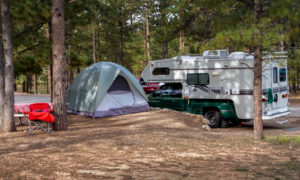
Internet access options for RVers can be a lifeline for staying connected while on the road. Whether you’re checking emails, streaming entertainment, or staying in touch with loved ones, having access to the internet is essential. Fortunately, there are three primary ways for RVers to remain online, each with its own advantages and disadvantages.
Cellular Data: The Most Widespread Option
Cellular data is the most widely used method for RVers to stay online. Major cellular carriers, such as Verizon, AT&T, T-Mobile, and Dish Wireless, offer a variety of cellular data plans tailored to RV users. These plans typically provide a certain amount of high-speed data, after which internet speeds may be throttled. But there are options for unlimited cellular data as well.
Pros:
- Widely available, even in remote areas
- High data speeds, when available
- Easy to set up and use
Cons:
- Can be expensive
- Data speeds can vary depending on location and network congestion
- May require a special antenna or booster for optimal performance
Wi-Fi Hotspots: A Convenient Alternative
Wi-Fi hotspots are another popular option for RVers. Wi-Fi hotspots are often found in libraries, coffee shops, and campgrounds. Some offer internet access for a small fee. Users can typically purchase day or month-long passes. However, free Wi-Fi hotspots are common. Some public places, such as libraries and coffee shops, may offer free Wi-Fi but can be unreliable or have limited bandwidth.
Pros:
- Affordable option
- Easy to connect to and use
- Can be found in many locations
Cons:
- Speeds can vary depending on the number of users and the hotspot’s infrastructure
- May not be available in all locations
- May not be secure, making it risky for sensitive activities
Satellite Internet: For Remote Locations
For RVers venturing into remote areas, satellite internet is often the only viable option. Satellite providers, such as Starlink, HughesNet, and ViaSat, offer satellite internet access.
Pros:
- Available virtually anywhere in the world
- Reliable, even in remote areas
- No data caps or throttling
Cons:
- Most expensive option
- Latency, or delay in data transmission, can be an issue
- Requires specialized equipment installation
Choosing the Right Method: Considerations for RVers
The best method for staying online while RVing depends on individual needs and preferences. Factors to consider include:
- Frequency of Internet use: RVers who only use the Internet occasionally may find that Wi-Fi hotspots are sufficient. However, those who use the Internet regularly or stream videos may need cellular data or satellite internet.
- Travel destinations: RVers who primarily travel to urban areas may find cellular data adequate. However,those who venture into remote areas may need satellite internet.
- Budget: Cellular data plans can be expensive, while Wi-Fi hotspots are more affordable. Satellite internet is the most expensive option but may be necessary for RVers who need reliable internet access in remote areas.
Conclusion: Staying Connected on the Road
With various Internet access options for RVers available, You can stay connected to the Internet while enjoying the freedom of the open road. By considering their individual needs and preferences, RVers can find the best method for staying online and making the most of their RVing adventures. For more information, see: rvmobileinternet.com
You may also be interested in these articles on Internet access:
Winegard ConnecT RV Internet WiFi Extender
Internet Access on the Road with WiFi
10 Ways to Get Free WiFi Wherever You Travel








I work with a company called RovAir (http://www.rovair.com). We rent aircards on a short-term basic. With our service you don’t have to commit to a 2 year contract with a cellular provider. We have seen a lot of interest from the RV community. Basically wherever a cellular signal can be had you should be able to utilize our service.
On the subject of mobile phones and internet in RV’s
I have another great tool to keep in mind on the road.
A great tool I know of for locating RV or truck repair services just about anywhere is 4rs.mobi.
It does reqiure an internet connection or Mobile phone, but it works on almost all mobile phones and it is free to use.
4rs.mobi runs on the truck service provider database from 4roadservice.com and can be used to find RV dealers, truck stops truck repair facility’s, and just about any other service an RV’er or trucker might need on the road.
When we first started living in an RV fulltime, we put a lot of research into mobile internet options for RVers because we also work online. There are a ton of options out there to choose from, but we eventually settled on 3G mobile internet through Millenicom and have been very happy with it.